 It's been a while, lovely reader, since StinkyLulu's delivered a Supporting Actress profile. Betsy Blair's still a wallflower (though I promise to take her around the dance floor in the next 72 hours) and I'm a week behind in kicking 1967 into gear. But the cd's out terrorizing the populace as we speak, and the roiling pool of academentia is simmering to a lower boil, so I can assure you that the profiles are back on track as of this morning. Though, sadly, the occasion of my return from mini-hiatus is hardly that auspicious, given that we're turning to the shrieking one-note of...
It's been a while, lovely reader, since StinkyLulu's delivered a Supporting Actress profile. Betsy Blair's still a wallflower (though I promise to take her around the dance floor in the next 72 hours) and I'm a week behind in kicking 1967 into gear. But the cd's out terrorizing the populace as we speak, and the roiling pool of academentia is simmering to a lower boil, so I can assure you that the profiles are back on track as of this morning. Though, sadly, the occasion of my return from mini-hiatus is hardly that auspicious, given that we're turning to the shrieking one-note of...approximately 17 minutes and 39 seconds
24 scenes
roughly 16% of film's total running time
24 scenes
roughly 16% of film's total running time
Estelle Parsons plays Blanche Barrow, the prim sister-in-law of Clyde, who somewhat unwittingly finds herself along for the ride of a multi-state shoot-em-up free-for-all.
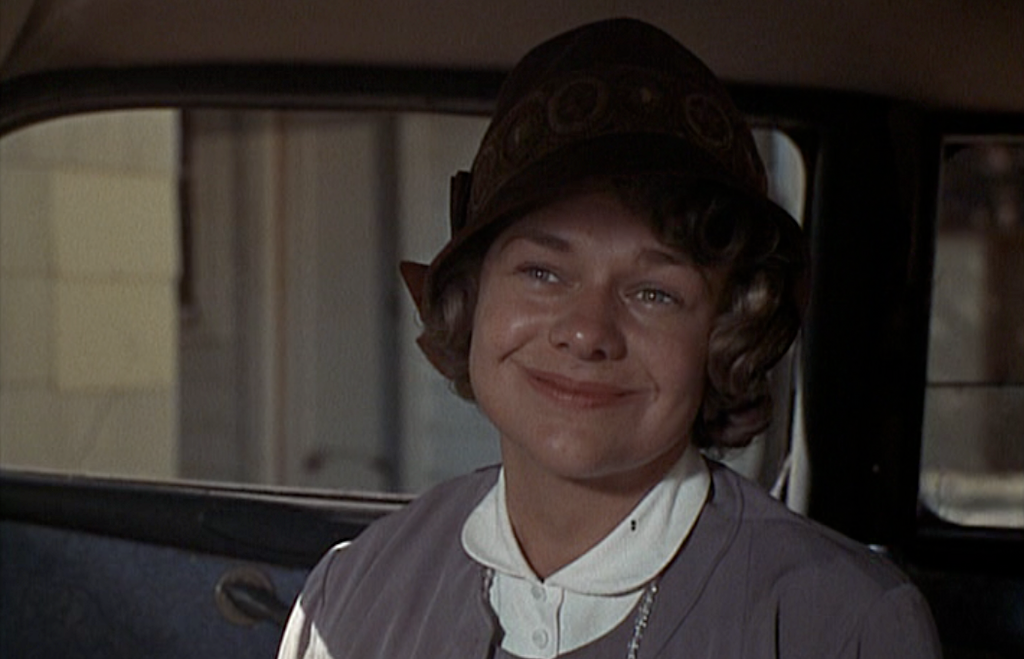 Parsons's Blanche is a righteous priss, a chattering shrew whose clinging desperation marks the difference between her Blanche's love for Buck (a genial doofus ala Gene Hackman) and Bonnie's elemental connection with Clyde (Faye Dunaway and Warren Beatty, both glib but effective as embodiments of criminal passion). The film offers Bonnie and Clyde as countercultural outlaws. Clyde imagines himself a Robin Hood, and Bonnie fancies herself as escaping the the middle class mediocrity to which she was born. Blanche, on the other hand, wants only to be married to her beloved Buck and to lead a respectable life as husband and wife.
Parsons's Blanche is a righteous priss, a chattering shrew whose clinging desperation marks the difference between her Blanche's love for Buck (a genial doofus ala Gene Hackman) and Bonnie's elemental connection with Clyde (Faye Dunaway and Warren Beatty, both glib but effective as embodiments of criminal passion). The film offers Bonnie and Clyde as countercultural outlaws. Clyde imagines himself a Robin Hood, and Bonnie fancies herself as escaping the the middle class mediocrity to which she was born. Blanche, on the other hand, wants only to be married to her beloved Buck and to lead a respectable life as husband and wife. Parsons makes much of Blanche's dim desire to be both of and above the circumstances in which she finds herself. Indeed, her Blanche is the kind of woman to sniff imperiously when someone sitting next to her slurps the soup kitchen soup. And there's one person that Parson's Blanche knows, for sure, that she's better than: Bonnie.
Parsons makes much of Blanche's dim desire to be both of and above the circumstances in which she finds herself. Indeed, her Blanche is the kind of woman to sniff imperiously when someone sitting next to her slurps the soup kitchen soup. And there's one person that Parson's Blanche knows, for sure, that she's better than: Bonnie. The other thing that Parsons's Blanche knows how to do: shriek. Director Arthur Penn exploits Parsons's ear-splitting wail -- more ambulance siren than human voice -- as a kind of aural overlay, amplifying the stressful intensity of each and every gunfight once Bonnie and Clyde hit the road as the nation's most wanted fugitives from justice. The first time Penn uses Parson's shriek, it becomes one of the film's most darkly comic interludes. The scene begins as just another quiet afternoon at the hideout when "the laws" arrive. When the first shots are fired, Parson's Blanche begins to shrieking.
The other thing that Parsons's Blanche knows how to do: shriek. Director Arthur Penn exploits Parsons's ear-splitting wail -- more ambulance siren than human voice -- as a kind of aural overlay, amplifying the stressful intensity of each and every gunfight once Bonnie and Clyde hit the road as the nation's most wanted fugitives from justice. The first time Penn uses Parson's shriek, it becomes one of the film's most darkly comic interludes. The scene begins as just another quiet afternoon at the hideout when "the laws" arrive. When the first shots are fired, Parson's Blanche begins to shrieking. And she doesn't stop shrieking. Not when her feet leave the ground in a humble attempt at flight.
And she doesn't stop shrieking. Not when her feet leave the ground in a humble attempt at flight. Not when she uses her trusty spatula to deflect bullets.
Not when she uses her trusty spatula to deflect bullets.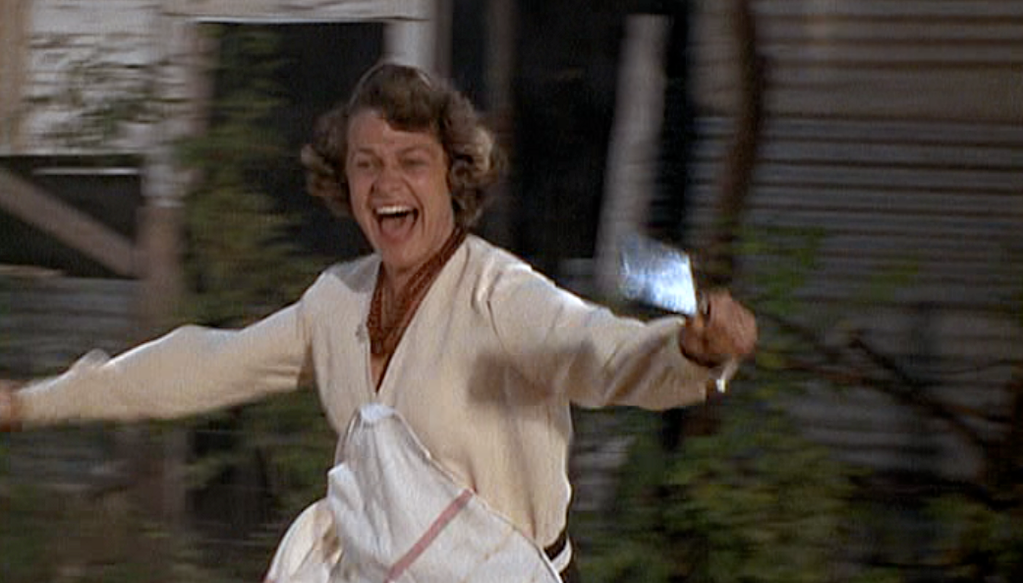 Not even when she defends herself against Bonnie's rage at nearly getting them all killed.
Not even when she defends herself against Bonnie's rage at nearly getting them all killed. Only when she looks into the eyes of her beloved Buck does Parson's Blanche stop screaming. Indeed, when she looks at Hackman's Buck, Parsons gives a glimpse of just how much Blanche loves and needs her husband, how she'll do anything to be with this man, the man she loves.
Only when she looks into the eyes of her beloved Buck does Parson's Blanche stop screaming. Indeed, when she looks at Hackman's Buck, Parsons gives a glimpse of just how much Blanche loves and needs her husband, how she'll do anything to be with this man, the man she loves.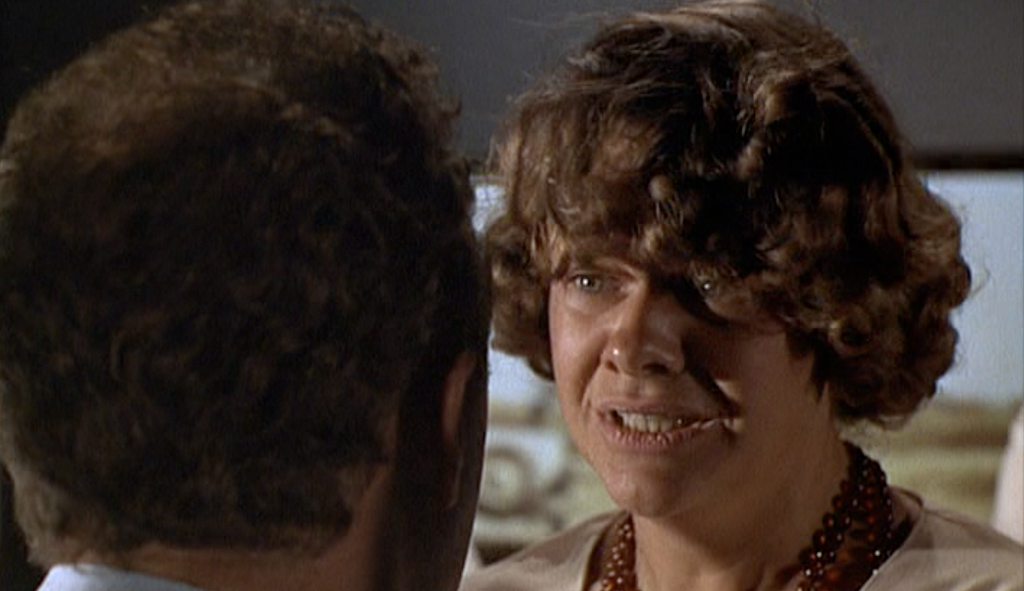 And Parson's Blanche does continue on the run with this haphazard band of outlaws, alternately asserting her difference from them and her rights and privileges among them, as when Blanche demands her share of the loot.
And Parson's Blanche does continue on the run with this haphazard band of outlaws, alternately asserting her difference from them and her rights and privileges among them, as when Blanche demands her share of the loot. The "real" Blanche Barrow apparently thought that the film and Parsons's performance made her "look like a screaming horse's ass." (Perhaps some among you, lovely readers, might agree?) But, as tough as it is to get beyond Parsons's shrewish shriekiness, her indelible work in the film does contribute to the film's effectiveness.
The "real" Blanche Barrow apparently thought that the film and Parsons's performance made her "look like a screaming horse's ass." (Perhaps some among you, lovely readers, might agree?) But, as tough as it is to get beyond Parsons's shrewish shriekiness, her indelible work in the film does contribute to the film's effectiveness. Indeed, it seems to me that Parsons's Blanche is -- more than perhaps any other character in the film -- smack in the crosshairs of all the film's main axes of emotional tension: respectability versus illegitimacy; boredom versus excitement; living the life you want versus living the life you've got... Blanche is right there, neck deep in the middle of each existential mess.
Indeed, it seems to me that Parsons's Blanche is -- more than perhaps any other character in the film -- smack in the crosshairs of all the film's main axes of emotional tension: respectability versus illegitimacy; boredom versus excitement; living the life you want versus living the life you've got... Blanche is right there, neck deep in the middle of each existential mess.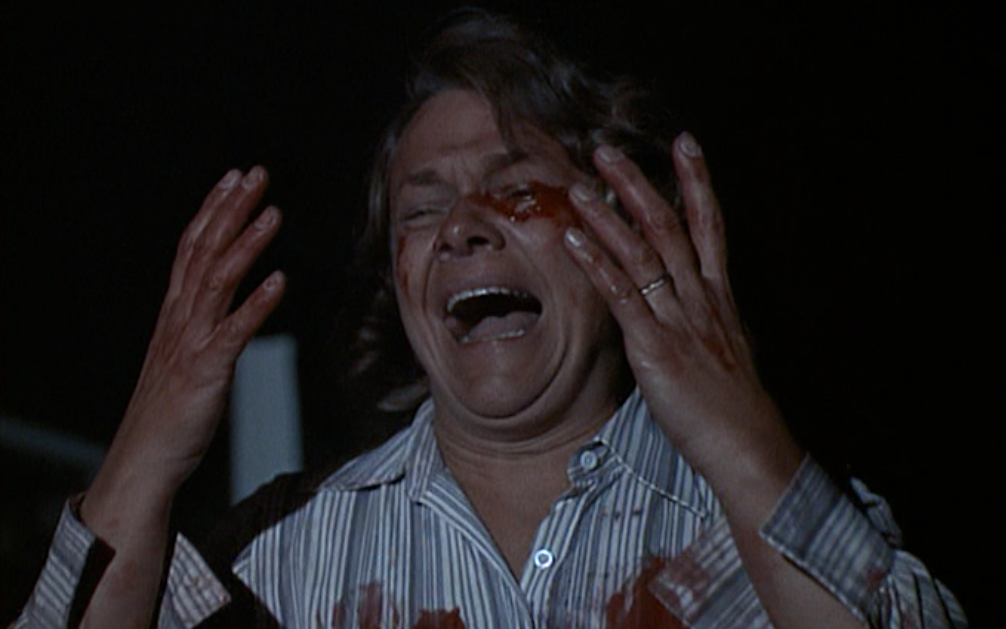 Which is, perhaps, why Blanche's blinding on the same night that she loses her beloved husband becomes, perhaps, the most haunting image of the film (aside from the legendary, climactic, bullet-riddled assassination scene)
Which is, perhaps, why Blanche's blinding on the same night that she loses her beloved husband becomes, perhaps, the most haunting image of the film (aside from the legendary, climactic, bullet-riddled assassination scene)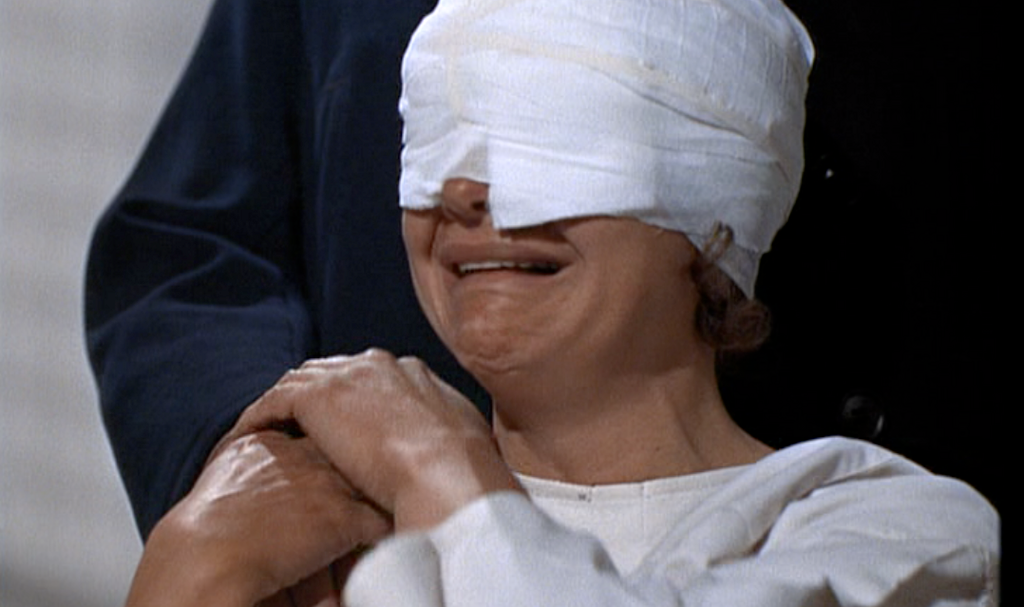 With Parson's Blanche -- blind, widowed, incarcerated -- the film's darkest message is driven home: not only that "you can't always get what you want" but also that, really, no one cares...
With Parson's Blanche -- blind, widowed, incarcerated -- the film's darkest message is driven home: not only that "you can't always get what you want" but also that, really, no one cares...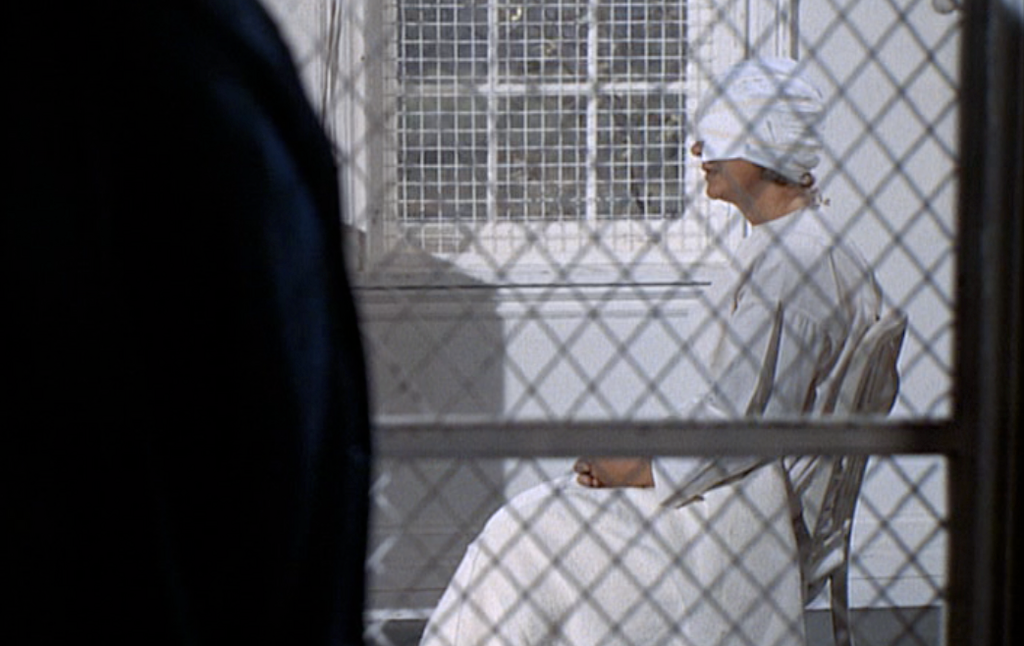 It's a strange performance, in a stranger role, in an even stranger film -- but it almost makes sense that voters couldn't get Miss Parsons's shrieking innocent out of their heads.
It's a strange performance, in a stranger role, in an even stranger film -- but it almost makes sense that voters couldn't get Miss Parsons's shrieking innocent out of their heads.



3 comments:
I found her performance merely an annoyance at first, but it has kind of grown on me... I really thought it was interesting how Parsons gave Blanche's relationship with Buck a kind of incestual father/daughter undertone - not only does she repeatedly call him 'daddy', but you can see at the beginning, when she is first introduced to Bonnie, Clyde and C.W., she hides behind Buck, clutching his hand tightly, just like a frightened child. Her contrariness, her tendency to shriek - it's really a child's performance delivered by an adult, which is what is so intriguing about it.
However, I can't help but think that the performance would have been much more powerful and accessible had Parsons had a few more close-ups and opportunities to speak without being spoken over. The distance that the camera held from Parsons was a big obstacle in connecting to the character and the performance.
Michael J. Pollard, who plays C.W. Moss, is my neighbor. The next time I see him I'm going to ask him what it was like working with Estelle Parsons.
I can't wait to see her in "Bonnie and Clyde" again to evaluate what seems to be a divisive performance.
Post a Comment